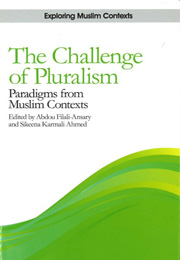Book contents
- Frontmatter
- Contents
- Introduction: Theoretical Approaches to Cultural Diversity
- PART ONE THE HERITAGE: HISTORICAL CONTEXTS
- PART TWO CONTEMPORARY THOUGHT
- 3 Civil Society and Conflict Management: Bangladesh's Experiences
- 4 Pluralism and Liberalism in Contemporary Islamic Thought
- 5 Democracy, Pluralism and Political Islam
- 6 Islam, Conflict and Democracy
- 7 The Diversity of Cultures in the Crucible of Globalisation
- About the Contributors
- Index
5 - Democracy, Pluralism and Political Islam
from PART TWO - CONTEMPORARY THOUGHT
Published online by Cambridge University Press: 12 September 2012
- Frontmatter
- Contents
- Introduction: Theoretical Approaches to Cultural Diversity
- PART ONE THE HERITAGE: HISTORICAL CONTEXTS
- PART TWO CONTEMPORARY THOUGHT
- 3 Civil Society and Conflict Management: Bangladesh's Experiences
- 4 Pluralism and Liberalism in Contemporary Islamic Thought
- 5 Democracy, Pluralism and Political Islam
- 6 Islam, Conflict and Democracy
- 7 The Diversity of Cultures in the Crucible of Globalisation
- About the Contributors
- Index
Summary
The aim of this chapter is to address whether political Islam, in some of its well-known versions, is compatible, as far as its socio-political ends are concerned, with the requirements of just, democratic institutions. The emphasis here is on the term “just”, as certain understandings of democratic institutions have no conceptual connection between justice and democracy. In theory, a state may be democratic but not just, where “just” is understood in its broad sense. I argue that democracy without justice, though logically conceivable, is democracy only in form but not in substance. At best, it is procedural democracy. Therein lies the rationale for my desire to explore not merely whether the aims of political Islam are reconcilable with the requirements of democratic institutions, but, more importantly, whether they are reconcilable with just, democratic institutions. However, I shall limit myself to the political sense of “just”, for within the representative movements of political Islam there is nothing in the nature of their common central aims that prevents them from being reconcilable with economic or social justice. Nevertheless, as will become evident in this chapter, the nature of these common aims precludes their being reconcilable with political justice as it relates to democratic praxis.
I begin with some preliminary remarks about the meaning and criteria of just, democratic institutions. It would help to focus the discussion at this point on what lies at the heart of these requirements, namely pluralism.
- Type
- Chapter
- Information
- The Challenge of PluralismParadigms from Muslim Contexts, pp. 62 - 77Publisher: Edinburgh University PressPrint publication year: 2009

